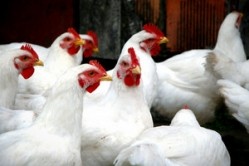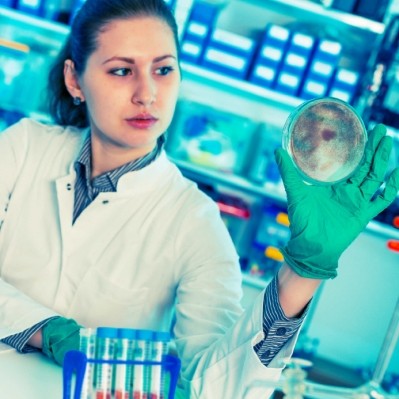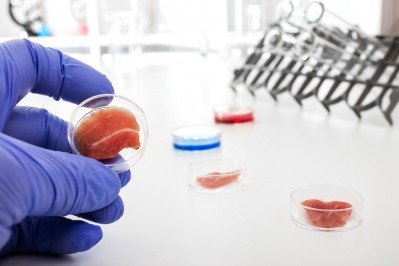Special Edition: pig and poultry feed trends
‘First of its kind’: AbCelex developing additive to replace antibiotics for poultry

The feed additive is designed to target and neutralize poultry colonizing bacteria that cause diseases in humans, and reduce disease outbreak in poultry flocks, said Saeid Babaei, president and CEO of AbCelex Technologies. The company recently received a $3.4m grant from the Canadian Government to further develop their product for commercial production.
“It’s going to be the first of its kind,” he told FeedNavigator. “We have a very specific targeted antibody-based approach for a part of the bacteria – our background is development of tech for human disease.”
“Our approach doesn’t kill the bacteria, but binds to a certain portion of the bacteria that renders bacteria immobile and does not allow them to divide in the chicken gut resulting in log-scale reduction of their load,” he said. “We just make the bacteria useless.”
Once ingested, the product acts as a “pre-harvest strategy” to improve food safety by reducing the contamination in the chicken’s intestinal tract, he said. In the future, the supplement may be expanded to work with other diseases or swine.
Product details
The feed additive has been designed as a powder to mix into chicken feed, said Babaei. It provides birds, especially broilers, with a “passive immunity” or the antibodies needed to protect the bird from salmonella or campylobacter without needing an immune system response.
“This is not a classical feed additive or drug – it’s a passive immunity,” he said. The supplement works by including the antibodies in a flock’s feed, similar to what would be produced through use of a vaccine, but without the need to give the vaccine first, he added.
Antibodies can be challenging to work with as they are vulnerable to stomach acid and sensitive to the heat used in pelleting animal feed, but these have been engineered to resist those conditions, he said. “They’re notorious for degradation in the gut and high heat – our antibody has to be almost cooked for the formulation of feed to make the pellet,” he added.
“Our product goes to premix companies,” said Babaei. “It’s very stable at room temperatures up to one year, and it can be given in the drinking water as well – or produced in a live organism such as a probiotic.”
Initially the supplement is being targeted for release in the US followed by Canada and Europe, he said. “We’re looking for submission of the full data package [to the regulatory authorities] in each jurisdiction in 2018 with an expected one-year review process– so most likely an early 2019 market launch,” he added.
Antibiotic replacement
Part of the focus in designing the feed supplement was to allow producers to move away from the use of antibiotics in poultry production, said Babaei.
There is an increasing concern about the use of antibiotics in both the US and Canada, he said. However, there also are major challenges in using vaccines in poultry production, especially for broilers, as bird lifespans may not be as long as those in other livestock.
“Our technology goes into play rather [quickly] and effectively,” he said. “There’s no need to play with the immune system, which may not be effective in the case of broilers.”
Development path
Work to design single-domain antibody-based approach started in 2010, said Babaei. The first challenges that had to be solved were preventing the product from degrading either in the process of making bird feed or in the stomach.
The two bacteria, salmonella and campylobacter were picked because they are so prevalent in bird production and are hard to manage, he said.
However, some work remains before the supplement can be brought to market, he said. “The focus right now is not on making the antibody; we’re good at that. It’s how we can produce it in mass production and economically,” he added.
The team is looking to perfect its technique for inexpensive production at commercial scale, said Babaei.
A different team at the company is working on tailoring the antibodies for specific regions that are host to different prevalent strains of the bacteria, he said. “Ideally the way it will work is is for AbCelex to develop specific single-domain antibodies for major regions around the globe with different pathogenic strain outbreak," he added.
"The strain specificity for salmonella and campylobacter could be different for Asia, Europe and North America, necessitating that AbCelex to develop a number of different antibody formats for each region," he said.
Additional trials also need to be completed to pinpoint the minimum use of the supplement, he said. “You’d want to give it as a treatment, but the data we have to date is as a preventative measure,” he added.
The Canadian funding contribution and matching funds will allow the company to scale up production and run larger field trials needed to answer questions about the use of single-domain antibodies as a treatment, said Babaei.
Future steps look to potentially expand the antibody supplement into other species like swine, he said.
“Now we know the poultry stakeholders and we may move into swine,” he said. “Product format and field trials would be different, but the leg work has already been done.”








